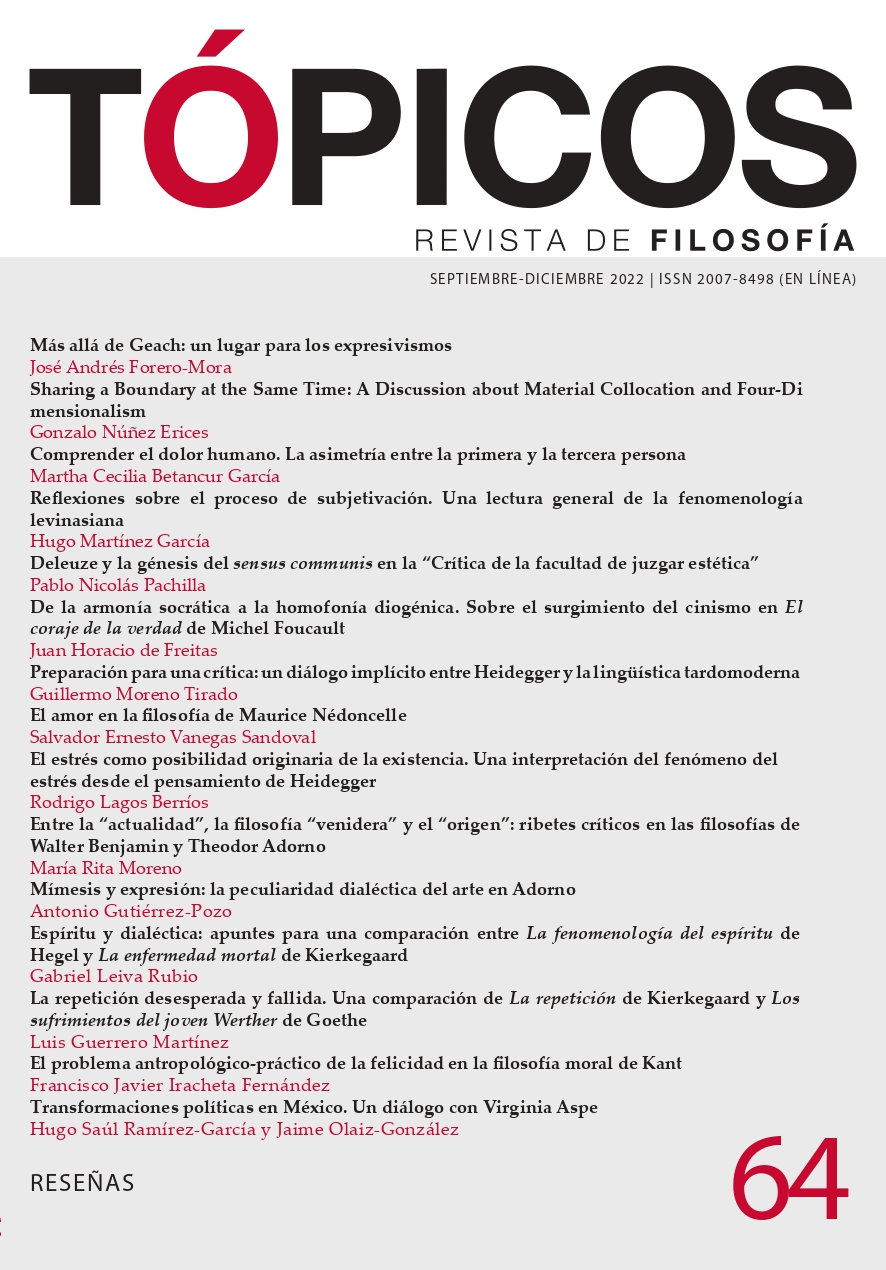Publicado 2022-08-13
Palabras clave
- G. Deleuze,
- Kant,
- sensus communis,
- génesis,
- facultades
Derechos de autor 2022 Tópicos, Revista de Filosofía

Esta obra está bajo una licencia internacional Creative Commons Atribución-NoComercial-SinDerivadas 4.0.
Cómo citar
Resumen
En el presente trabajo se examina la lectura realizada por Gilles Deleuze de la “Crítica de la facultad de juzgar estética” de Immanuel Kant. Mostraremos a) que el autor sostiene una tesis interpretativa según la cual la tercera Crítica kantiana no sería un complemento sino un fundamento de las anteriores, en la medida en que los acuerdos determinados de las dos primeras Críticas suponen la posibilidad de un acuerdo indeterminado entre las facultades; b) que la exigencia de una génesis del sensus communis por parte de Deleuze puede resumirse en tres requisitos: discordancia, contingencia y vivificación; y c) en qué sentidos Deleuze considera que dichas exigencias se encuentran satisfechas en el texto kantiano.
Referencias
- Deleuze, G. (1968). Différence et répétition. PUF.
- Deleuze, G. (1969). Logique du sens. Éditions de Minuit.
- Deleuze, G. (1990). Pourparlers. Éditions de Minuit.
- Deleuze, G. ([1963] 2002). L’idée de genèse dans l’esthétique de Kant. En L’île déserte et autres textes. Textes et entretiens (1953-1974). (pp. 79-101). Éditions de Minuit.
- Deleuze, G. ([1963] 2004). La Philosophie critique de Kant. PUF.
- Deleuze, G. ([1963] 2005). La idea de génesis en la estética de Kant. En La isla desierta. Textos y entrevistas (1953-1974). (pp. 77-98). J. L. Pardo (trad.). Pre-textos.
- Deleuze, G. ([1978] 2008). Kant y el tiempo. Editorial Cactus (trads.). Editorial Cactus.
- Deleuze, G. y Guattari, F. (1980). Capitalisme et schizophrénie II. Mille plateaux. Éditions de Minuit.
- Deleuze, G. y Guattari, F. (1991). Qu’est-ce que la philosophie? Éditions de Minuit.
- Dosse, F. (2009). Gilles Deleuze y Félix Guattari. Biografía cruzada. S. Garzonio (trad.). FCE.
- Flaxman. G. (2005). Transcendental Aesthetics: Deleuze’s Philosophy of Space. En I. Buchanan y G. Lambert (eds.), Deleuze and Space. (pp. 176-188). Edinburgh University Press.
- García, R. (1999). La anarquía coronada: la filosofía de Gilles Deleuze. Colihue.
- Kant, I. (1913). Kritik der Urteilskraft. En Gesammelte Schriften. Band V. (pp. 167-515). Herausgegeben von der Königlich Preußischen Akademie der Wissenschaften. De Gruyter.
- Kant, I. (1923). Gesammelte Schriften. Band VIII. Herausgegeben von der Königlich Preußischen Akademie der Wissenschaften. De Gruyter.
- Kant, I. (1963). Gesammelte Schriften. Band IV. Kritik der reinen Vernunft. (1. Auflage 1781). Prolegomena. Grundlegung zur Metaphysik der Sitten. Metaphysische Anfangsgründe der Naturwissenschaft. Herausgegeben von der Königlich Preußischen Akademie der Wissenschaften. De Gruyter.
- Kant, I. (1991). Crítica de la facultad de juzgar. P. Oyarzún (trad.). Monte Ávila.
- Kant, I. (2006). Crítica de la razón pura. M. Caimi (trad.). Colihue.
- Kant, I. (2007). Crítica del juicio. M. García Morente (trad.). Espasa Calpe.
- Kerslake, C. (2009). Immanence and the Vertigo of Philosophy. From Kant to Deleuze. Edinburgh University Press.
- Kogan, J. (1965). La estética de Kant y sus fundamentos metafísicos. Eudeba.
- Nehring, R. (2010). Kritik des Common Sense: Gesunder Menschenverstand, reflektierende Urteilskraft und Gemeinsinn – der Sensus communis bei Kant. Duncker & Humblot.
- Pachilla, P. (2018). Deleuze y la inversión del kantismo. ARETÉ. Revista de Filosofía, 30(1), 147-162. DOI: http://dx.doi.org/10.18800/arete.201801.007.
- Pachilla, P. (2019a). Rectitud y desviación del pensamiento en la lectura deleuziana de Kant. Anales del Seminario de Historia de la Filosofía, 36(3), 705-723. DOI: https://dx.doi.org/10.5209/ashf.6106.
- Pachilla, P. (2019b). Sentido común y buen sentido en Deleuze. Revista Valenciana. Estudios de Filosofía y Letras, 23(1), 139-174.
- Pachilla, P. (2019c). Sentido y comunidad. La dimensión política del sentido común en Deleuze. CONTRASTES. Revista Internacional de Filosofía, 24(1), 41-58. DOI: https://doi.org/10.24310/Contrastescontrastes.v24i1.6702.
- Pachilla, P. (2019d). Yo es otro. Tiempo y escisión en el cogito trágico de Deleuze. Logos. Anales del Seminario de Metafísica, 52(1), 95-115. DOI: https://doi.org/10.5209/asem.65855.
- Pachilla, P. (2020). Resonances of the Voice of Being. Analogy and Univocity in Deleuze and Kant. En D. Olkowski y J. Ferreyra (eds.), Deleuze at the End of the World: South American Perspectives. (pp. 103-114). Rowman & Littlefield.
- Sánchez Rodríguez, M. (2010). Sentimiento y reflexión en la filosofía de Kant. Estudio histórico sobre el problema estético. Georg Olms.
- Smith, D. (2006). Deleuze, Kant, and the Theory of Immanent Ideas. In C. Boundas (ed.), Deleuze and Philosophy. (pp. 43-61). Edinburgh University Press.
- Smith, D. (2012). Essays on Deleuze. Edinburgh University Press.
- Zhouhuang, Z. (2016). Der sensus communis bei Kant. Zwischen Erkenntnis, Moralität und Schönheit. De Gruyter.





